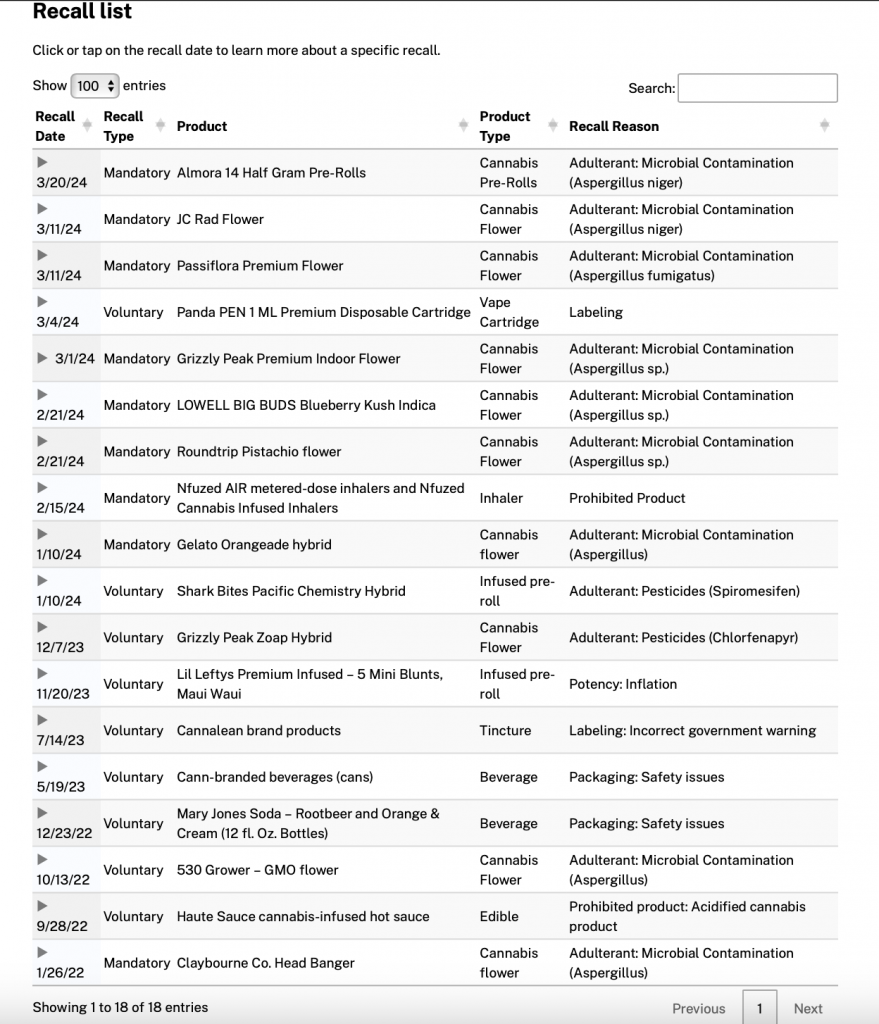Dramatic Increase in Cannabis Product Recalls in California
By Lauren Mendelsohn
March 21, 2024
Over the past few months, the California Department of Cannabis Control (DCC) has issued numerous recalls of cannabis products sold within California. This follows several years of almost zero cannabis product recalls in California, despite how the DCC and its predecessor, the Bureau of Cannabis Control, had the authority to issue recalls since 2021 and 2018 respectively.
Types of Cannabis Product Recalls
A cannabis product recall is either a “voluntary recall” or a “mandatory recall.” These are governed by 4 Cal. Code of Regs. §17226 and 4 Cal. Code of Regs. §17227 (within the DCC’s regulations), respectively.
All cannabis licensees in California must develop plans for voluntary recalls of cannabis products that are misbranded or adulterated. According to §17226, these plans must include:
- Factors necessitating a recall;
- Which personnel are responsible for implementing the recall procedures;
- Notification protocols for customers, other licensees and the general public; and
- Protocols for the collection and destruction of recalled products.
Recalled products intended for destruction must be quarantined for at least 72 hours (longer if requested by the DCC) and must have information affixed to them which identifies their content and weight. The following information about the recalled cannabis products must be entered into the METRC tracking system: the weight and count of the cannabis goods, reason for destruction, and date the quarantine period will begin. After the quarantine period, the recalled products must be destroyed in accordance with 4 Cal. Code of Regs. §17223 by rendering them unusable and then disposing of this waste properly. Licensees who choose to initiate a recall on their own must notify the DCC within 24 hours of doing so.
A voluntary recall is initiated by a licensee due to their own discovery that particular products are misbranded, adulterated, or defective in some way. The licensee then notifies the DCC, who publishes information about the voluntary recall on their website and via email alerts to inform other licensees and the public.
Additionally, the DCC may require all licensees to conduct a mandatory recall pursuant to §17227 when (in their words) there is an “immediate and serious threat to human life or health, and other remedies would cause an unreasonable delay.”
The DCC then works with licensees to ensure that distribution of any recalled products ceases and that such products are properly handled, remediated (if applicable) and/or disposed of. Licensees whose METRC records indicate they are in possession of recalled products can expect to be contacted by the DCC and asked to report on how they addressed the issue within a stated time frame.
Failure to comply with recall requirements is considered a “Tier 2” violation according to the DCC’s Disciplinary Guidelines, with a minimum penalty of a 15 to 30 day suspension and/or a fine, and a maximum penalty of license revocation.
Why the Increase in Recalls?
Part of the reason for the increase in cannabis product recalls in California has to do with new regulations pertaining to standardized methods and SOPs for testing laboratories that went into effect on January 1, 2024. Another factor is likely an increase in staffing at the DCC focused on enforcing the prohibition on adulterated or misbranded products. Furthermore, this signals a transition from the DCC’s initial “education” phase, which has lasted for the past few years, into an “enforcement” phase, which is likely to continue for the foreseeable future.
Please contact our office if you have inquiries about developing compliant recall plans or how to comply with a cannabis product recall.
This information is provided as a public educational service and is not intended, nor should be construed, as legal advice. For specific questions regarding cannabis product recalls in California, contact the Law Offices of Omar Figueroa at 707-829-0215 or info@omarfigueroa.com to schedule a confidential consultation.



